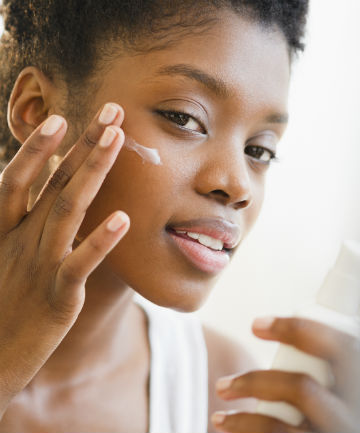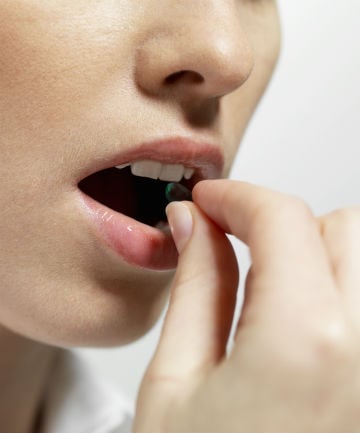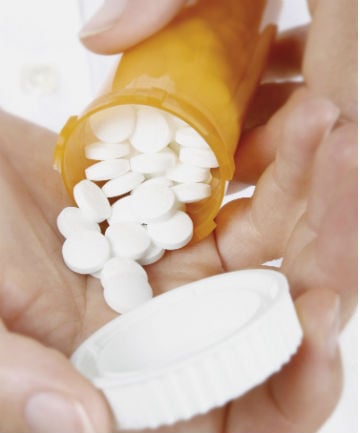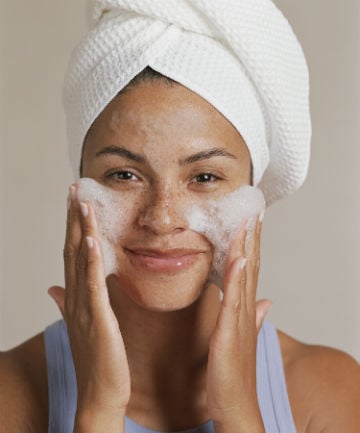ICYM, retinoids, a class of vitamin-A derivatives, are one of the biggest skin care superstars out there, with the ability to do everything from fade spots to smooth wrinkles to, you guessed it, treat acne. Because they do have so many other benefits—and most dermatologists will recommend one as part of any good skincare routine anyway—there's really no need to stop using one. The one major exception is if you're pregnant. Any kind of retinoid, whether it's a prescription or OTC option, is a no-no for mommas-to-be. "Topical retinoids should be stopped as soon as you start planning to become pregnant," advises Erin Gilbert, MD, a dermatologist in Brooklyn, NY. "If your pregnancy comes as a surprise, stop using it right away," she adds. In either case, stop using it cold turkey, not gradually.
Image via Getty
Image via Getty
Lots of women will tell you that this oral medication is the only thing that got rid of their hormonal acne. Still, if you've been taking it for a while, your skin has cleared up, and you want to come off it, it's best to do so gradually, suggests Joshua Zeichner, MD, assistant professor of dermatology at Mount Sinai Hospital in New York City. "I usually recommend decreasing the dose by 25 milligrams every month, to see what the lowest possible dose a patient can take before breaking out," he says. Keep in mind that it takes several weeks for the effect of the medicine to kick in, and just as long for it to wear off, he adds. And if you're prego? Spironolactone can lead to birth defects, so you definitely don't want to mess around here. If you're not yet pregnant but planning on it, discuss tapering it off with your derm, advises Gilbert. And if you suspect you may be pregnant or unexpectedly find out you are, stop taking it immediately.
Image via Getty
Image via Getty
Often prescribed to help address the inflammation associated with acne, oral antibiotics are one treatment you should most definitely stop taking cold turkey, says Zeichner. "Lowering doses or taking it intermittently essentially tempts bacteria on your skin, and can increase your risk of developing antibiotic resistance," he explains. As far as pregnancy is considered, he recommends stopping them at least one month before you start trying to have a baby.
Image via Getty
Image via Getty
One of the most common topical treatment ingredients, BP (as the cool kids call it) is found in everything from cleansers to spot treatments. And while it works by killing acne-causing bacteria, there's no reported resistance to benzoyl peroxide, points out Zeichner, meaning you can gradually taper off use. Regardless of the type of BP product you're using, he recommends applying it every other day, gradually getting down to just once a week. While he says it's usually not recommended for pregnant women, Gilbert points out that it may be a case-by-case basis. Your best bet (as it is for all of these)? Discuss your specific skin issues—and the products you're using or meds you're taking—with both your derm and gyno.
Image via Getty
Image via Getty
For this other common OTC acne-fighter—which works by dissolving oil and sticky skin cells that can clog pores—follow a protocol similar to that of benzoyl peroxide, gradually decreasing the frequency with which you're using it. Keep in mind that it's also not recommended during pregnancy, says Zeichner, but if you're pregnant and breaking out, don't stress. Topical clindamycin and erythromycin are thought to be safe in pregnancy, says Gilbert, and Zeichner adds that glycolic acid is OK, too.
Image via Getty
Image via Getty






